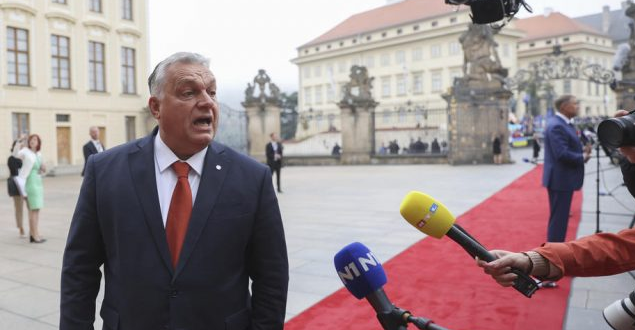After adopting legislation to address corruption, Hungary received two more months to prove EU funds are safe and there’s no need for financial sanctions. If Hungary succeeds, it will not be because of such cosmetic moves, but because of how EU politics work.
Astrange charade is going on in Brussels: the EU wants to show that it can ‘buy’ the rule of law (or at least bring about a significant decrease in levels of corruption) in a member state, while Hungary pretends it is ready to make compromises over practices and policies that normalise large-scale corruption.
Both parties know that the other is lying, but the performance must go on.
The protagonist of this act is the one-fifth of Hungary’s annual budget, 13.3 billion euros, that Viktor Orban’s government is supposed to get from the EU, but payments for which have been called into question by the European Commission over concerns about the state of the rule of law in Hungary.
From this amount, 5.8 billion euros should have come from the Next Generation EU recovery package, covered by common debt of the EU. Hungary has not seen a cent of this money, because until now the EU Commission refused to approve the country’s detailed recovery spending plan, practically suspending the money months before even launching the mechanism in April that would make such a suspension legally possible – something about which defenders of the rule of law should worry, too.
This mechanism, the so-called “rule-of-law conditionality regulation“, is being applied to another sum of 7.5 billion euros. This is the amount that the EU Commission has officially recommended should be suspended from Cohesion Fund payments due to the large-scale misuse of EU money in the country. The loss of EU funds would be particularly painful in the current economic situation, so the Hungarian government is trying to avoid the sanctions with the promise of a comprehensive legislative package designed to prevent corruption related to EU funds.
It seems that after 11 years of running arguments with Hungary over the state of the rule of law in the country, the EU Commission has become familiar with the methods of the government, as it mostly qualified the offered reforms with phrases like “if implemented correctly and timely”, “depending on the details”, and “could in principle be capable of addressing the issues”.
The details became public soon after the EU Commission’s recommendation on September 18 to apply financial sanctions. In the subsequent weeks, the Hungarian parliament hurriedly adopted a legislative package of several elements and a large part of the new laws have already entered into force.
New rules that won’t actually stop corruption
Beyond some obvious cosmetic measures – such as the new asset-declaration rules for certain public officials, which are charmingly naive in a country awash with beneficial owners – the package has two core elements. Both might appear solid reforms at first glance, but on closer examination it is clear they will be insufficient in preventing large-scale corruption and the misuse of EU funds.
A so-called Integrity Authority is going to be established which, according to the legislation, should be “completely independent”. Yet the same is prescribed by law for many other state institutions that in reality function merely as arms of the government.
The only task of this new authority will be to undertake steps if other authorities normally responsible for the prevention and investigation of corruption and fraud concerning EU funds fail to do their job properly. But the steps available to the Integrity Authority do not add up to a genuine deterrent.
The Integrity Authority’s remit will mostly be to prepare annual reports and deliver recommendations regarding public procurement. The strongest power it can exercise is to suspend public procurement procedures if fraud or corruption is suspected, but such a suspension can only last for a maximum of two months. If other authorities fail to prevent or investigate suspected fraud or corruption, the Integrity Authority can take them to court.
In principle, the Integrity Authority must notify the European Anti-Fraud Office (OLAF) and the European Public Prosecutor’s Office (EPPO) about any suspected cases of fraud or corruption involving EU funds. However, this cannot be taken as a guarantee of action, given that OLAF is not authorised to directly conduct investigations in member states and Hungary has not joined the EPPO, which can only investigate in participating countries.
The other important element of the package seeks to address criticism of the country’s prosecution service, which too often appears passive or has closed investigations pre-emptively whenever the suspected corruption occurred in circles close to the government or the prime minister himself. This might not be unrelated to the fact that the prosecutor general, Peter Polt, is a close ally of Prime Minister Orban and used to be a member of the governing Fidesz party.
To ensure that corruption and fraud concerning EU money does not remain unprosecuted, a new special procedure will be introduced into the Code of Criminal Procedure for crimes like corruption, bribery, fraud, embezzlement, cartels at public procurements and abuse of official position. In cases where the prosecution terminates the investigation without any indictments, anyone can challenge the decision before a court. In the event the court finds that the termination was ill-founded, the complainant could issue an indictment in place of the prosecution service.
However, especially in complex corruption cases, it is highly unlikely that random complainants will be able to effectively present the case, because unlike the prosecution they do not have the necessary investigative powers. And if the charges are not sufficiently proven, courts cannot convict the accused in line with the presumption of innocence.
This latter piece of legislation has not yet come into effect, because the Fidesz majority in parliament has requested the Constitutional Court examine its constitutionality. It is scheduled to go before the court on Tuesday, October 18.
The Constitutional Court, to which most of the judges were elected exclusively with the votes of Fidesz MPs, has not so far contradicted the government in any politically relevant cases. As such, the judges might be forgiven for wondering what their task is: to strike down the law as a means to do the dirty work for the government in resisting EU pressure (and risk the loss of huge amounts of EU money), or to quickly approve the law in order to give judicial backing to the government’s ‘reforms’ in Brussels?
Don’t call my bluff to save face
Although the Orban government argues that these new pieces of legislation will be enough to convince the EU Commission to halt the conditionality mechanism and release the 7.5 billion euros of Cohesion funds, it does not really matter anymore what the EU Commission is convinced about, as it is up to the governments of member states to make the final decision. (The other 5.8 billion euros in recovery funds, suspended by the EU Commission, is still subject to scrutiny by Brussels on some mysterious legal grounds.)
The normal deadline for the Council of the EU to decide is one month after the EU Commission makes its recommendation, which would be October 18. But this has been extended for a further two months, implying that the extra time will be used to establish whether Hungary’s reforms are proving sufficient.
Yet this is just as big a conceit as the Hungarian government’s ‘anti-corruption package’. The first asset declarations based on the new legislation, for example, are due only in January. We do not even know when the law about the new criminal procedural rules will, if at all, enter into force. And even if it does, it is impossible to finish even a single criminal procedure pursuant to these rules within two months. The new Integrity Authority will probably be set up by December, but it won’t have time to begin any substantive work. Of course, some strict recommendations can be issued or even a few public procurements can quickly be suspended just to maintain appearances.
If finally, in December, the Council of the EU votes against sanctioning Hungary, it will not happen because the governments of other member states are so impressed about Hungary’s anti-corruption reforms, but because political calculations dictate they should show magnanimity. Corruption is far from being a Hungarian peculiarity within the EU, and rule-of-law deficiencies affecting EU funds is a term flexible enough to allow in practice mutual indulgence in advance of hard times like today.
 Eurasia Press & News
Eurasia Press & News




